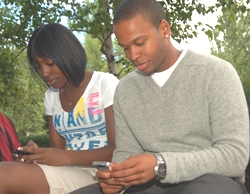- Home
- /
- UAlbany News
- /
- Release
- /
UAlbany Offers Back-to-School Tips for Securing Computers
Contact(s): Catherine Herman (518) 956-8150
 |
Portable Internet devices such as smartphones and PDAs are also at risk from computer viruses and other malware. (Photo Mark Schmidt) |
ALBANY, N.Y. (August 18, 2010) -- Between studying, social networking and e-shopping, college students face multiple risks to their privacy and financial security when they connect to the Internet. Malicious advertisements delivered from legitimate websites are among a host of potential threats users face every time they go online.
University at Albany Information Security Officer Martin Manjak and Associate Professor of Information Technology Management Sanjay Goel offer several common-sense methods for students to protect themselves and their computers from cyber criminals.
- Keep your PC secure: Older versions of popular software packages such as Flash, iTunes, Java and others are regularly exploited by malicious advertising placed on legitimate websites. In the IT world, security updates or 'patches' help prevent most attacks delivered via the web. Utilize personal software security applications, which are designed to detect vulnerable programs and provide updates.
- Use anti-virus software for computer security and keep it up-to-date: With Spyware, spam and Trojan Horses capable of quickly and fatally infecting the hard drive of any unsuspecting user, it is important to secure your computer with the latest versions of anti-virus software.
- Turn off your computer when not in use: Criminals can't hack your computer if it's powered down and disconnected from the Internet. Plus, you're saving power in the process.
- Use complex passwords; keep them confidential: Whether it's Blackboard, Facebook or an online bank account, your password is the only thing that stands between your personal information and cyber criminals. Utilizing longer passphrases (greater than 12 characters) with special characters helps protect you. Don't use your birthday or a last name.
- Back up your computer regularly: Online threats are not the only risk you face. After all, anything that spins at 7,000 rpm 24 hours a day, seven days a week will eventually break down. Whether its malware or old age, the only way to protect your files in case of a computer crash is to back up important data files regularly to a CD or flash drive.
- Review your Facebook Privacy Settings: You might be surprised at the electronic audit trail you're leaving (Google your name or gaming handle). In cyberspace, public postings last forever. Are you comfortable with your privacy settings and who can see your information?
- Don't click on every link: Viruses are often spread through links seemingly shared by friends. These threats can be transmitted via instant messaging, e-mail, or through direct messaging on popular social networking websites. Malicious links have the potential to infect any device you use, including smartphones and PDAs.
- What to do when someone asks for your password: During your college career, you will inevitably receive numerous e-mail messages asking for your password. These messages will pretend to come from the University Help Desk, Web Team, or another trusted entity. In reality, the messages are being sent by someone trying to steal your personal information. This type of attack, known as 'phishing,' can be especially effective when they threaten you with loss of your account if you do not reply. Ignore or delete them. Without exception, these messages are fraudulent. The University will never ask you to reveal your password.
![]() For more news, subscribe to UAlbany's RSS headline feeds
For more news, subscribe to UAlbany's RSS headline feeds
Educationally and culturally, the University at Albany-SUNY puts "The World Within Reach" for its 18,000 students. An internationally recognized research university with 58 undergraduate majors and 128 graduate degree programs, UAlbany is a leader among all New York State colleges and universities in such diverse fields as public policy, nanotechnology and criminal justice. With a curriculum enhanced by 300 study-abroad opportunities, UAlbany launches great careers. For more information about this globally ranked University, visit www.albany.edu. For UAlbany's extensive roster of faculty experts, visit www.albany.edu/news/experts.shtml.


